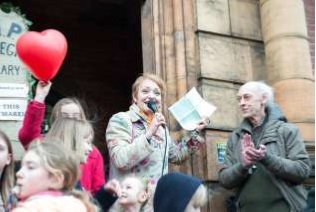Lambeth's reasons for closing our library on 31st March were not financial.
Lambeth insist that our library was closed at the end of the 2015/16 financial year to save money. I cannot see any justification for this assertion. Except for trivial savings on utilities there has not so far been any reduction in expenditure. But Lambeth are paying for a security guard and foregoing the hire fees paid by desk space users, a total of about £2150 a week.
Before the closure the number of staff employed by Lambeth Libraries was reduced from 120 to 80, in response to the cuts; but the closure has not yet resulted in any further reduction. Eventually there might be a reduction equivalent to the three staff in our library, saving about £2,800 a week. But by then more desk spaces would no doubt have been in use if the library had remained open. There was also other income from the library and Lambeth have the cost of relocating the Home Visit Service. At most the saving from closing our library will be trivial.
Calculations of the above income and expenditure figures are here.
Stephen Carlill

